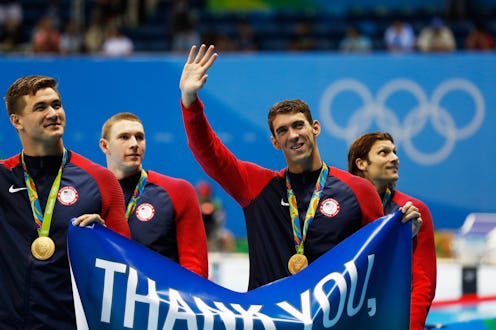Life
How Much Sleep Olympic Athletes Need To Succeed
Olympic athletes follow an intense training schedule that requires hours of gym time a day. But logging practice hours isn't the only important part of their regiment. Getting plenty of shut-eye is also a crucial factor in an athlete's lead-up to the Olympics. So how much sleep do Olympians have to get a night to succeed?
Olympian or not, we all know just how important sleep is to one's physical and mental well-being. Not getting enough can affect everything from your muscles to your skin. But rest and recovery is even more significant when you're training in a gym for multiple hours a day. Why? Not getting a good shut-eye every night can not only be detrimental to an athlete's performance, but it can also cause physical damage, as tissues in the body don't have time to heal overnight.
That's why most Olympic athletes consider sleep a required and vital part of their training — one that's just as necessary as exercising and finding the right diet. In fact, most Olympians aim to sleep at least eight hours a night during their training. As Shannon Miller, former member of the 1996 gold medal-winning Magnificent Seven gymnastics team, recently told Van Winkle's, "During competition and training, I made sure to get at least eight hours of sleep and more whenever possible. I typically went to bed around 9:30 or 10 p.m. and woke up around 7:30 a.m."
And it's not just about nighttime sleeping. Most Olympians also make an effort to take naps during the day. "Sleep is huge in my sport. Recovery is the limiting factor, not my ability to run hard," Olympic marathoner Ryan Hall said, per Arianna Huffington's book Thrive. "I typically sleep about eight to nine hours a night, but then I make sure to schedule 90 minute 'business meetings' — aka naps — into my day for an afternoon rest."
Speed skater Chris Creveling backed up this strategy, telling Van Winkle's, "If I had a hard training the day before, which is usually the case, it’s definitely important for me to nap. I’ll nap for 20 to 40 minutes, and that’s enough time for your body to recuperate and it allows your mind to calm as well."
Knowing that rest is crucial to competitors, many Olympic training facilities take specific measures, like installing blackout curtains and providing hypoallergenic pillows, to create the optimum sleep environment.
Basically, this all just goes to reinforce what we already knew: sleep is an imperative factor to your health, no matter if you're an average joe or an Olympic gold medalist.
